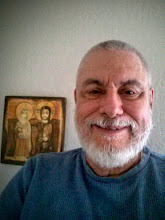There are two things that come to mind for me related to wine making that I would like to mention as "shadow sides." One is a technical consideration. Not all yeast is helpful! The wine maker has to do the best he or she can to keep everything clean as possible to guard against contamination by airborne yeast, or yeast that had already been on the grapes. We start with killing off all yeast on the grapes by adding sodium metabisulfide to the must, covering the must with plastic, and letting it set for twelve to twenty-four hours before adding a special wine yeast. Once fermentation is underway and throughout the process the wine maker uses fermentation locks and carefully lessens the chances of contamination of the must by unwanted yeast. If such yeast gets into the fermenting wine it can be ruined--turned to vinegar.
Of course, concern for contamination and an unwanted change shows up as a spiritual issue too. In a conversation about bread Jesus warned, "Watch out--beware of the yeast of the Pharisees and the yeast of Herod." (Mark 8:14-15). Now, this is a tricky statement that might lend itself in our time to anti-semitism. The Pharisees were a branch of Judaism in Jesus' time that were not always opposed to Jesus, some were friendly to him and they shared some important beliefs in common with Jesus. The warning seemed to be more particular to a tendency to a legalism that could blind some of those members to compassion and justice. Herod also seemed marked as spiritually corrupt and a collaborator with the Roman occupiers. We should be careful to safeguard ourselves against forces that can corrupt us or blind us to genuine need in the world. We shouldn't take our continuing spiritual health for granted. However, we should also be careful not to be over-obsessed with spiritual purity. Let's live spiritually aware. Let's be discerning about forces that might distort us or oppress others, but also move in the present and into the future with joy and trust in the power of the Spirit at work in and around us.
The second shadow I'd like to speak about in the art of wine making is an awareness of addiction, dependency, and excess. Alcoholism is a disease that affects many people directly or indirectly. No one chooses to be an alcoholic any more than someone chooses to be allergic to something. The effects of alcoholism can be devastating, and the recovering process often has an essential spiritual component. Excessive use of alcohol can be death-dealing. Moderation in using most things is likely to be a virtue. It surely is the case for using alcohol. St. Benedict of Nursia, in his sixth century Rule for monasteries urged moderation in food and drink--including wine. Some people need to abstain from drinking intoxicating beverages for various reasons. We should always respect that choice. We all need to be prudent when taking powerful chemicals, drugs and alcohol alike, into our bodies. Sorry if this sounds like a health safety lecture, but I have seen people I loved hurt and killed.
Subscribe to:
Post Comments (Atom)

No comments:
Post a Comment